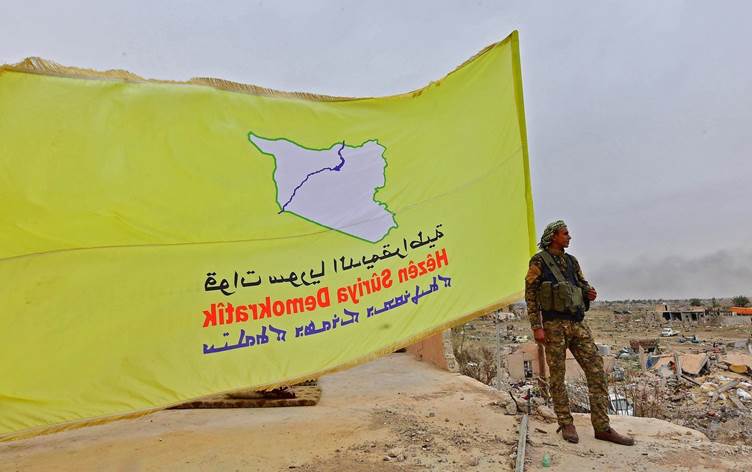A member of the Kurdish-led Syrian Democratic Forces in northeast Syria (AFP)
A tribal leader has been killed in eastern Syria — and it’s not apparent who is responsible.
On August 2, Sheikh Mutsher Hamud Jeidan al-Hifl, the head of the largest tribal confederation in Deir ez-Zor Province, was assassinated by gunmen. Another tribal leader, Sheikh Ibrahim Khalil Jeidan al-Hifl, was wounded.
Sheikh Mutsher is the third leader of the al-Agidat and al-Baggara tribes killed by unknown gunmen in the past two weeks.
Two members of the Kurdish-led Syrian Democratic Forces were killed and an SDF vehicle blown up in subsequent clashes amid tribal protests last week.
A local source said a military delegation, from the SDF and the US-led coalition against the Islamic State, visited Sheikh Mutsher’s family to ease tensions.
“SDF and Coalition said they would try their hardest to catch the killer, and [the tribe] agreed to this….The Aqadat tribe’s people have agreed to stand off for a month,” the source said.
US representatives met with a group of tribal leaders and dignitaries from Deir ez-Zor Province, and the US Embassy in Damascus, closed since 2011, issued a statement condemning the assassination.
Who Did It?
No one claimed responsibility for the attack, and residents of Deir ez-Zor said it was not the Islamic State, who lost their last village in the area in March 2019.
A Deir ez-Zor native said that while ISIS continues to assassinate people in the region but “not any top tribal figures”.
He asserted that the latest killings were by “people linked to the Syrian regime”, and the Kurdish autonomous administration in northeast Syria said Sheikh Mutsher was targeted to stir up tensions between Kurds and Arabs.
Relations between the Kurdish authority, the SDF, and Arab residents have been strained since the SDF completed the eviction of ISIS from northeast Syria last year. There are widespread claims of discrimination, abductions, and forced conscription.
A Pentagon report, released this week, said most Arabs give “passive support” to the SDF as a “preferred alternative to ISIS or the Syrian regime”. However,power-sharing between Kurds and Arabs “remains imbalanced” as the SDF and Kurdish authorities have “made limited efforts to incorporate Arab military and civil leaders into their ranks”:
Local Arabs occupy positions on SDF and SDC-associated military and civilian institutions, but they lack equal influence and feel excluded from military and political decision-making processes.
The report also cited residents’ unease over worsening economic conditions, increased ISIS activity, and uncertainty over the coalition’s mission.

